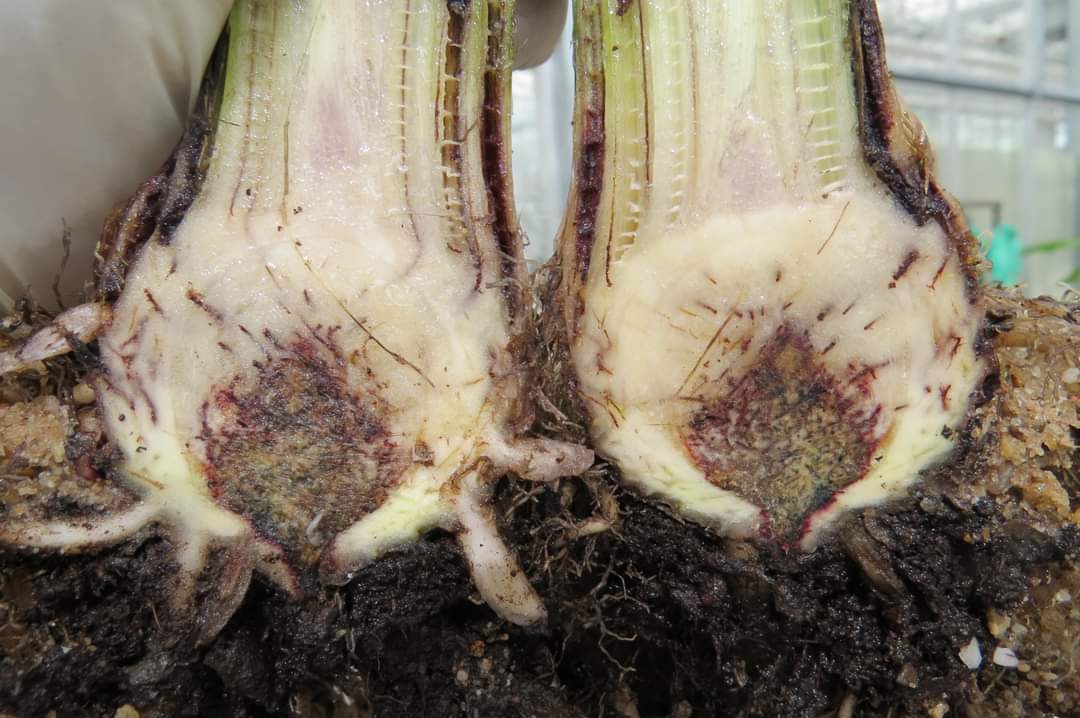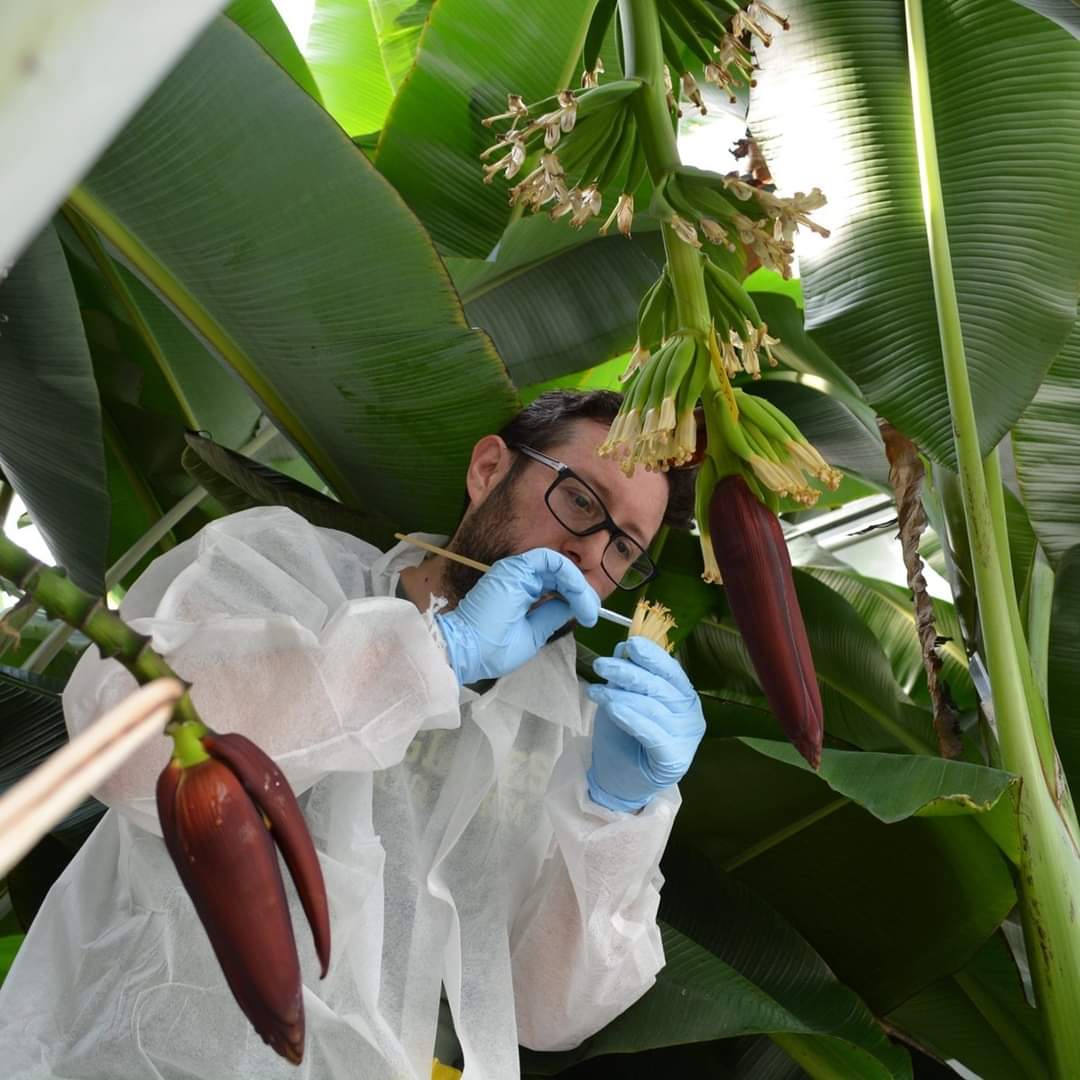6 March 2024
Recent evolution of Fusarium TR4 strain has increased diversity in the ‘virulence’-DNA of the fungus

Cavendish banana plant heavily infected by Fusarium TR4
Recent evolution in the soil-borne fungus causing Fusarium Wilt in banana (Fusarium oxysporum f.sp. cubense) was driven by large-scale duplications in parts of the fungal DNA that are known to be the source of its ‘virulence’ genes.
A study on genomic diversity and evolution in Fusarium oxysporum strains leading to this new insight has recently been published in New Phytologist by an international and multidisciplinary research team led by Utrecht University and Wageningen University & Research, both in the Netherlands, having 6 KeyGene scientists as co-authors.
The information presented in the scientific paper is of importance to banana breeding groups, such as the KeyGene team working for the Yelloway breeding initiative, developing banana varieties with resistance against the devastating Fusarium TR4 variant.
Survival of the fittest
Like in plants and animals, evolution is an important drive for the development and survival of micro-organisms such as bacteria, viruses, and fungi. By understanding the dynamics of evolution and the changes in genetic material, we can better understand processes, such as the interaction between plants and fungi, leading to disease or resistance. Developing and implementing groundbreaking innovative technologies for crop improvement can greatly benefit from a better understanding of this process.
Banana pathogen
The international research team, led by Utrecht University and Wageningen University & Research, focussed on Fusarium oxysporum diversity due to its significant impact on global banana production. Especially, the Fusarium TR4 strain that is currently spreading across the world, reducing and threatening food production and farmers’ incomes, is of significant concern. Once a farm is contaminated with this fungus, banana cultivation is no longer possible in the contaminated soil, unless resistant varieties are developed and introduced.
69 Strains studied
Breeding for TR4-resistant banana varieties, a kind of guided evolution in banana, can greatly benefit from a better understanding of the genetics and evolution of the fungus. The research team analyzed the DNA of 69 different strains of Fusarium oxysporum, making it possible to compare the DNA (the genomes) of all of them. Recent developments in DNA sequencing and data science allow for this type of ‘pan-genomics’ research, in which large numbers of genomes of different plants, fungi, or other organisms are compared with each other.
Banana breeding
KeyGene’s banana breeding team in the Netherlands develops varieties resistant to the TR4 Fusarium Wilt and Black Sigatoka, caused by an air-borne fungus. The new findings about the evolution and diversity of Fusarium oxysporum will certainly assist KeyGene’s team in breeding varieties with long-lasting TR4 resistance.

Anouk van Westerhoven, first author of the paper, University of Utrecht & Wageningen University & Research
“By comparing different Fusarium genomes, we saw that genomic regions associated with virulence are surprisingly diverse among Fusarium isolates that can infect banana. This knowledge is essential to guide efforts into resistance breeding in the future.”
Anouk van Westerhoven, first author of the paper, University of Utrecht & Wageningen University & Research
Publishing team
The paper was published by an international and multidisciplinary research team, harboring scientists from Wageningen University & Research, KeyGene, and Utrecht University in the Netherlands; Max Planck Institute for Evolutionary Biology and the University of Kiel in Germany; Catholic University of Leuven in Belgium; Eidgenössische Technische Hochschule Zürich in Switzerland; Universitas Sultan Ageng Tirtayasa in Indonesia; The University of Queensland, Australia; and the International Institute of Tropical Agriculture in Uganda.
Yelloway breeding
KeyGene’s banana breeding program is part of the Yelloway breeding program, which was initiated by Chiquita, MusaRadix, and KeyGene. The goal of the Yelloway varieties is to contribute to the sustainable cultivation of bananas, the income of farmers, and the production of food.

Fernando García Bastidas, KeyGene's Fusarium TR4 expert and head of the banana breeding for the Yelloway initiative
More to explore about KeyGene’s banana breeding and research
- Blogpost on the occasion of International Biodiversity Day 2023: “Building back biodiversity: expanding the banana family”
- News item about paper in PlosOne, 2022: Fungus that almost destroyed banana business in 1950s may help to protect nowadays banana business
- News item 2021: WUR and KeyGene to contribute to African banana varieties resistant to Panama disease